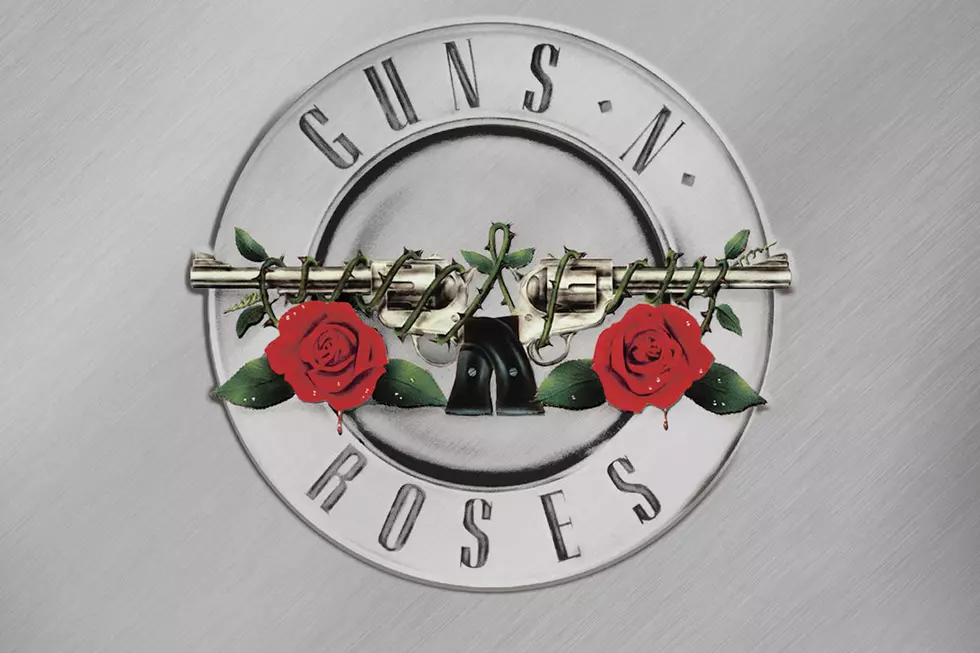
Why Guns N’ Roses Tried to Stop Their Own Greatest Hits LP
Guns N' Roses' Greatest Hits was an unqualified success. Released on March 23, 2004, the compilation reached the Top 5 in the United States after topping the charts in the U.K.
Fans who'd waited more than a decade since Guns N' Roses most recent release, 1993's covers-filled The Spaghetti Incident?, found a 14-song collection featuring key songs from the band's smash 1987 debut Appetite for Destruction ("Sweet Child o' Mine," "Welcome to the Jungle," "Paradise City"), the big hit from 1989's GN'R Lies ("Patience"), favorites from the Use Your Illusion albums ("Don't Cry," "November Rain") and a more recent update of the Rolling Stones' "Sympathy for the Devil."
So, how come Axl Rose, Slash and Duff McKagan never wanted it released?
Greatest Hits arrived during a low point in the band's relationship with Geffen Records, as the Rose-led group continued long-delayed work on a new studio album. Their label decided to issue this set as a stop-gap measure, both to stoke interest in Guns N' Roses after a series of defections and also to recoup some of the staggering expenses associated with ongoing album sessions.
Rose began work on the album, which would eventually be titled Chinese Democracy, back in 1994. By this point, Guns N' Roses had already gone through several roster changes, four producers and at least three recording studios, racking up a reported $13 million in production costs, according to Geffen documents.
Eventually, their label declined to continue paying for Chinese Democracy, and focused instead on completing a new compilation. "Having exceeded all budgeted and approved recording costs by millions of dollars," Geffen wrote in February 2004 letter, "it is Mr. Rose's obligation to fund and complete the album – not Geffen's."
Rose said he wasn't consulted on Greatest Hits, however, and his subsequent lawsuit against Geffen was joined by Slash and McKagan – even though they'd been out of Guns N' Roses since the early '90s.
"The band has not been given the opportunity to approve the choice of songs, the artwork, the release date or the remastering done on the tracks included on this compilation," Rose said in a statement at the time. "Founding member W. Axl Rose is concerned that not only will their audience be misled into believing that the planned compilation is an authorized release, but that it will hinder the release of the band's long-awaited new studio album."
They said the track selection was "fundamentally flawed" and "does not reflect the band's best work." The Guns 'N Roses release also noted that fans had "flooded the offices of Geffen Records' senior executives with thousands of emails over the last few weeks expressing their dissent." One online petition echoed the group's concerns about which songs were chosen, noting that "there are stronger tracks in their catalog that are not included."
Rose, McKagan and Slash filed for a temporary restraining order to stop the release of Greatest Hits just days before its announced arrival, specifically arguing that Geffen didn't have the right to issue remastered versions of their songs without prior approval.
A California judge disagreed. He found no evidence that the songs had been altered, and moreover worried about how much money Geffen's parent company stood to lose if everything was derailed so late in the process.
"Their lawsuit is meritless," Universal Music Group spokesman Peter LoFrumento told the Today show at the time. "Fortunately, since the court has denied their application for a temporary restraining order, the album will be released as scheduled."
When Greatest Hits arrived the following week, its flimsy packaging included no liner notes. Also missing were deeper cuts like "Out Ta Get Me," "Estranged" and "Mr. Brownstone" that might have told a larger story. But that apparently didn't bother band loyalists who hadn't heard all-new original Guns N' Roses material since 1991. They'd already made Geffen's most recent vault excavation, the two-disc concert compilation Live Era: 1987-1993, a gold-certified hit in 1999.
Greatest Hits did better still, eventually selling more than 6 million copies. A frustrated Rose went back to work on Chinese Democracy, while McKagan and Slash focused on a new band called Velvet Revolver. They reportedly never actually spoke to Rose through the entire litigation.
"Patching up their differences only long enough to try to stop this album from coming out may just have served to draw more attention to it and may have helped market it," Billboard charts editor Geoff Mayfield told the Los Angeles Times in 2004.
Ultimately, Rose needn't have worried about Greatest Hits hampering sales of a new Guns N' Roses album. Chinese Democracy, which was eventually considered one of the most expensive albums ever made, didn't arrive for four more years.
Greatest Hits then re-entered the Billboard chart at No. 3 in March 2012, after being put on sale for just 25 cents via Amazon and Google Play. That extended one of Billboard's longest streaks, as the compilation racked up more than 400 weeks on the charts.
The 30 Wildest Moments From Guns N' Roses' Use Your Illusion Tour
Guns N’ Roses’ Most Underrated Songs


